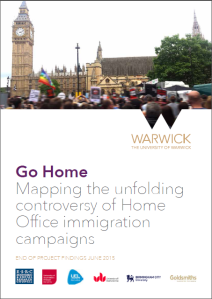This briefing highlights our key findings at the end of the funded research for our project. We have also produced a longer leaflet with more detailed findings for download as a pdf.
We will continue to develop further detailed writing on the findings in articles for academic journals and for broader audiences, and in a book which we expect to be available in 2016. You can continue to keep up with further outputs from the project on our website and through Twitter.
You may also be interested in a (very) short film about what we have found https://mappingimmigrationcontroversy.com/film/ and a series of videos of sessions at our end of project conference.
HEADLINE FINDING
Government publicity campaigns that demonstrate ‘toughness’ on immigration cause a significant minority of people to become more worried about irregular migration. This includes people who are scared that they are being targeted – both migrants and British citizens – and people who are worried that migration is ‘out of control’.
Ten key findings from our research
- We found no evidence that government communications about immigration and enforcement are based on research about ‘what works’ in managing immigration. The only research evidence policy makers mentioned to us was privately commissioned research on managing public opinion about immigration, particularly among those worried that immigration is ‘out of control’. Yet our research suggests the tactics used on this basis can increase fear and anxiety.
- Government campaigns on immigration provoked or increased anger and fear, among irregular migrants, regular migrants, and non-migrants, including people opposed to immigration. The latter told us they that the government campaigns were ineffective ‘theatre’.
- For people who were the subjects of immigration campaigns (or felt under threat from them), talking about the publicity campaigns often led them to think about their own experiences of immigration enforcement and feelings of fear and anxiety. Our research focused on communications campaigns, but participants made direct links to, for example, images of enforcement raids and their own experiences of immigration enforcement in their homes.
- Hard-hitting government publicity on immigration seemed to provoke new waves of pro-migrant activism. Anger and outrage was translated into online and street-based activism, including of people who had not been engaged in activism before.
- Some, but not all, activism has been migrant-led, and we identified inequalities in who felt able to take part in political debate because of real or perceived threats to their residency status as a result.
- Traditional anti-racism campaigns are finding it hard to keep up with changes in the focus of hostility and discrimination, for example with how to engage with the status of international students and asylum seekers.
- Our local case studies demonstrated local variations in how government campaigns were experienced, and the activism that was produced in response. In some places migrants and activists could build on existing infrastructures for political organising. In other places such resources did not exist or had dwindled, or energies were focused on service provision for vulnerable people in an increasingly difficult funding environment.
- There is not always solidarity between people being targeted by anti-immigration campaigns. We found several instances of hostility between different groups of migrants, often based on an idea that their own group was ‘deserving’ of residency and status in the UK, while others were ‘undeserving’.
- The different legal statuses that migrants can have is confusing, and for many people in the wider public, the distinctions between ‘illegal’ and ‘legal’, and between asylum seeker, refugee, student, worker, resident, and sometimes between migrants and ethnic minority British-born people is difficult to understand. Many people reported harassment for being ‘illegal immigrants’ when they had settled status, or were British citizens.
- We heard that many people had come to the UK because of ideals often promoted as ‘British values’ – such as democracy, the rule of law, individual liberty and mutual respect and tolerance for those with different faiths and beliefs. Their experience since arrival called into doubt the existence of these values in Britain.
Read more here

Pingback: Are you sleeping soundly? | Mapping Immigration Controversy
Pingback: » “Go Home”: Mapping Immigration Controversy – End of Project Conference The Sociological Imagination
Pingback: Are reinforced fences what it means to be human? | Mapping Immigration Controversy
Pingback: Will people be pacified by the Prime Minister’s limited promises on refugees? Or are we emulating Australia’s inhumane policies? | Mapping Immigration Controversy
Pingback: Windrush and Go Home: the whittling away of both rights and responsibility | Mapping Immigration Controversy